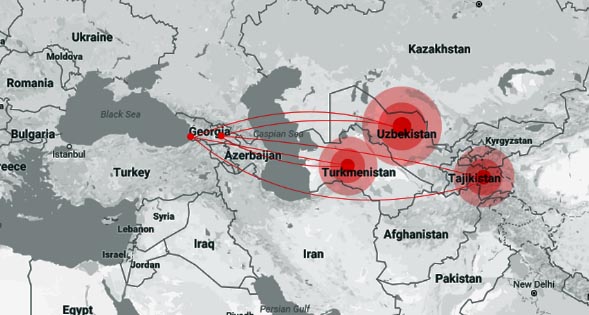By Davit Msakhuradze
An Uzbek girl was killed by two men hired by Nargizbegim Rakhmanova, a 29-year-old Uzbek woman, in Beshumi, on May 23, 2013.
Rakhmanova tricked five Uzbek women by promising them a high salary job in Turkey. But after their arrival in the Georgian Black Sea city of Batumi, she led them to N11 Khimshiashvili Street, flat N39, took their passports away, prohibited them from going outside, and forced them to have sexual relationships with other people for money.
She threatened that if they refused, Uzbek men living in Batumi would physically abuse them. Nargizbegim also threatened to tell Batumi police station the girls were prostitutes, and that they would be jailed. Finally she threatened to tell “everything” to the girls’ relatives.
The girls had to earn and pay back $US3,000 to Rakhmanova for "travel expenses". The Uzbek girls testified that she was taking all their money and giving back barely enough for food.
According to Batumi City Court, the first girl arrived on June 24, 2012 and the last on May 19, 2013.
The third girl to arrive, 25-year-old Raikhon K., reached Batumi on April 5, 2013. After a month, she was fighting with Rakhmanova and appeared to be psychologically unstable and in need of help.
Dilobar R., another of the girls, said she witnessed Rakhmanova hitting Raikhon K. because she refused to go to a disco club and work as a prostitute.
Raikhon K. warned Rakhmanova that she was going to get back to Uzbekistan and inform police about Rakhmanova’s illegal and violent actions.

Rakhmanova contacted Georgian citizen Kakha Diasamidze and Uzbek citizen Khaiot R., who were in Batumi. She offered them a total of $US2,000 to kill Raikhon K., as she represented a real threat to her business. Both man agreed to commit premeditated murder for that amount of money.
On May 22, 2013, the two men told Raikhon K. they would take her to the Tbilisi airport so that she could return to Uzbekistan. However, after reaching Khashuri, the halfway point on the west-east trip, they told the driver and the owner of the car, Anzor Diasamidze, to turn south towards Akhaltsikhe. At that time, Anzor Diasamidze didn’t know about the ordered murder.
Kakha Diasamidze and Khaiot R. killed Raikhon K. by hitting her on the head with a stone. The murder happened on an uninhabited territory called Shqernali near Beshumi. They hid the corpse nearby and burned her personal items.
Rakhmanova told the rest of the girls that Raikhon K. was taken to Uzbekistan. She forced all of them to change phone numbers. On June 1, 2013, Rakhmanova traveled back to Uzbekistan. She left behind the girls' passports.
Batumi City Court found Rakhmanova guilty according to Georgia’s Criminal Code Article 143 (trade of human lives), and Article 109 (murder under aggravating circumstances). She was given a life sentence in prison. Rakhmanova is still free. There is no information about her current location.
Kakha Diasamidze was sentenced to 17 years in prison and Khaiot R. received 18 years. The driver Anzor Diasamidze received two years for not revealing the information about the murder. He said that because Kakha Diasamidze was his relative and because he was threatened to keep silent, he couldn’t report the crime.
Kakha Diasamidze didn’t confess. Khaiot R. claimed aggravating circumstances. He said the motive for the murder was revenge against Raikhin K. for kidnapping his 4-year-old child.
Atipfund Georgia is the government fund for protecting trafficking victims. They offer shelter for three months, psychological and social rehabilitation, medical services, legal assistance, one-time compensation and, if necessary, interpreter services.
According to Qeti Beroshvili, public relations manager for Atipfund Georgia, the country's Ministry of Internal Affairs of Georgia, non-governmental organizations, medical institutions and representatives of the Public Defender's Office find trafficking victims and subsequently send them to Atipfund. There is a hotline (116 006) for immediate help.
“Any person can call who thinks that they are a victim of trafficking, and he /she will be provided with appropriate assistance,” says Berishvili.
Consultation hotline on trafficking issues. Information about calls in 2014-2016
Atipfund says they received 121 calls in 2014, 189 in 2015, and 123 in 2016. Only 5 people sued shelters in 2014, 6 in 2015, and 4 in 2016.
There were 9 one-time compensations for trafficking victims in 2014, 18 in 2015, and only 2 in 2016.
The one-time compensation paid to victims of trafficking
Atipfund has two shelters in Georgia, in Batumi (opened in 2006) and Tbilisi (2007). But one can stay in shelter for only 3 months to 1 year. After a victim leaves the shelter, an Atipfund social worker tries to connect with the victim, usually once every 3 months.
According to Berishvili, foreign beneficiaries of the Fund are mostly from Tajikistan, Uzbekistan and Kyrgyzstan.
According to a report from the Public Defender of Georgia, in the last five years up to 80 people were officially recognized as trafficking victims. Most are citizens of Georgia.